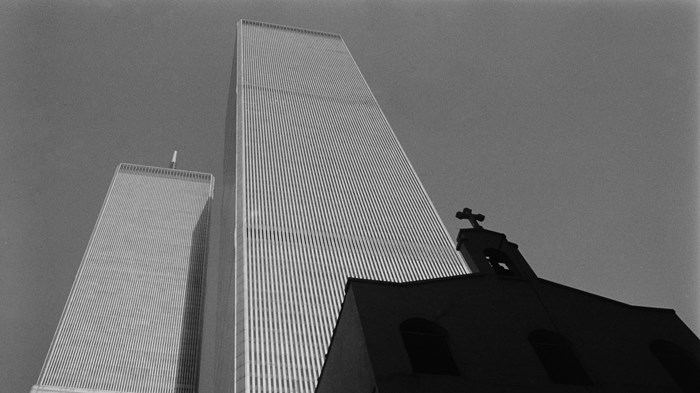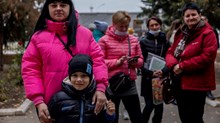“Day Of” Response Is Too Late. Here Are the Two Crucial Keys for Disaster Preparation

The morning of September 11, 2001, Greg headed south from our Upper West Side apartment to his office at Fifth Ave. Presbyterian Church at the corner of 55th Street in Manhattan. As he biked through the park, an unusual amount of emergency vehicles was streaming down Central Park Drive.
Laura had dropped our daughter Melanie at PS 163 for school and was walking in the park with her sibling Lizzie, who in two short hours would be dropped at her first day of preschool. Sun shone brightly: a perfectly crisp fall day.
Sirens created an unusual cacophony for morning. News of a plane hitting the first tower startled the usually lazy stoop dwellers as news starting moving from hazy to clear over the course of the next hour or so.
When Greg arrived at the church, things happened fast. He met Kate, a church member, at the front desk, crying. “Terrorists have hit the World Trade Center.” He still wasn’t sure exactly what that meant. Another pastor, Randy, told him to step outside to 5th Avenue. On this particularly clear day, they looked south and saw both towers smoking, about seven miles away. The scope of the tragedy was beginning to take shape.
And Greg was curious—wanting desperately to get up close and see where he might help at the scene. But he knew his calling was to be present, to be the pastor. And so, he headed up to his office, and within a few minutes, two twenty-something church members, Barb and Chris, knocked on the door, tears streaming down their faces.
“Greg, we work in the North Tower. We were late for work. Now all our co-workers, friends there are gone. What do we do?”
There is no Prayer in Times of Terrorist Attacks in the Presbyterian Book of Worship—or anything readymade—and Greg found himself saying, “I think we’re going to have to make this one up as we go along.”
At the moment, we are reminded of a line from the exquisite screenwriter Aaron Sorkin, “Heroes in drama are people who try hard to reach a virtuous ideal. And whether they succeed or fail really doesn't matter--it's the trying that counts.” Greg certainly did have an ideal—Jesus in the Gospels—even if he wasn’t trying to be a hero, that in itself seemed to make a difference.
At the same time, there was an even more profound realization that emerged in the days that followed: Disasters demand improvisation, and improv requires practice. Proverbs states it in a, well, proverbial way: “A farmer too lazy to plant in the spring has nothing to harvest in the fall” (Proverbs 20:4 The Message). Or as Kate Sanborn reframed genius: “1% inspiration and 99% perspiration.” (Many misattribute the saying to Thomas Edison, but Sanborn first brought up the idea in her academic lectures.)
Perspiration—or better preparation — is key to great work. You must know your jazz chops in order to improvise in the gig you’ve been waiting for all your life. Olympians know that hours in practice add up to winning seconds in competition. Generals and admirals rehearse scenarios to insure they have thought of each and every possibility before the battle begins. Plays are chosen by coaches and quarterbacks for those first 20 carries in a football game.
Just as critical as preparation is improvisation. Whether that be the solo, riffing with your bass player, or the unforeseen change in wind for the sprinter, or the surprise attack in the early dawn hours, or an injury to your quarterback. Improv is essential as we face what today brings.
We prepare for what we know and for what we don’t know. For a battle or a competition, we know the date and the time and the duration of the encounter. For life, we don’t. We train for life with a more ambiguous sense of what “game day” might look like.
When opportunity or disaster strikes, preparation makes all the difference on how you respond, how you function, how you lead, how you live.
After living in New York City during 9/11, we are certain: the night before and the day of is too late to prepare. The hard fact is you can’t prepare when the opportunity or the disaster hits. In the case of an epic disaster, this fact is undeniable.
In retrospect, we observed two key components that showed up in people able to improvise well in times of trouble.
Friendship
At Fifth Avenue Presbyterian in those days, we talked a lot about “2 a.m. friends.” You know, the person you would call in the middle of the night when a crisis hits. I can think of several such calls for example when our daughter ended up in writhing pain in Irvine and we reached out to Becky who played mom in our absence over at the ER. We knew Becky and her husband over a period of 30 plus years. We built trust, shared our lives, and in times of need were there for each other. Friends don’t just appear. Of course, angels appear occasionally, but true fellow sojourners grow like a vine or a sturdy tree. “Rejoice with those who rejoice, weep with those who weep” (Romans 12:15).
Relationship with God
In the aftermath of 9/11, we had countless conversations that started with “where is God in all of this?” Those who had walked with God seemed tethered while those without a faith seemed lost at sea. We knew those who moved out of the City “for a few months” who never returned. They couldn’t see straight and they had no place to find clarity. Wisdom and stamina don’t come on demand. Sure, we have momentary clarity, insight and wisdom some days, but when you are in crisis it is just as likely that you are stymied and in despair. Wisdom is like physical stamina in that you store it deep in your body to draw on as needed. It isn’t tangible, but it is real. When crisis hits, a wise person is quicker to find sense, direction, purpose and strength for themselves and for those around them.
This is why discipleship is part of our Christian life. Deepening our understanding of who God is and living into the implications in our social, psychological, vocational and spiritual existence is a marathon of preparation. For what, we might ask? For life. For what comes our way when we least expect it.
Eighteen months after 9/11 we left New York City to the true Northern part of California, off the grid, in a tree lined college town. We didn’t leave for reasons of escape, but you could have read it that way. Of course, here we are 20 years later in the aftermath of one of the biggest and certainly most destructive fires to hit the United States, the 2018 Camp Fire. Another disaster.
Our preparation for these disasters and all of life consisted of deep friendships and a regular practice of time with God in prayer, meditation, scripture and listening. God’s wisdom tethered and strengthened us for the journey making sense in the hardest of times when hope was in short supply. Preparation made the improvisation impassioned, ultimately deep and real, for us. And, we hope, for those around us.
Laura Cootsona is executive director of the Jesus Center in Chico, California, and Greg is an associate pastor at Bidwell Presbyterian Church, a lecturer at Chico State, and co-director of Science for the Church.
The Better Samaritan is a part of CT's
Blog Forum. Support the work of CT.
Subscribe and get one year free.
The views of the blogger do not necessarily reflect those of Christianity Today.





















